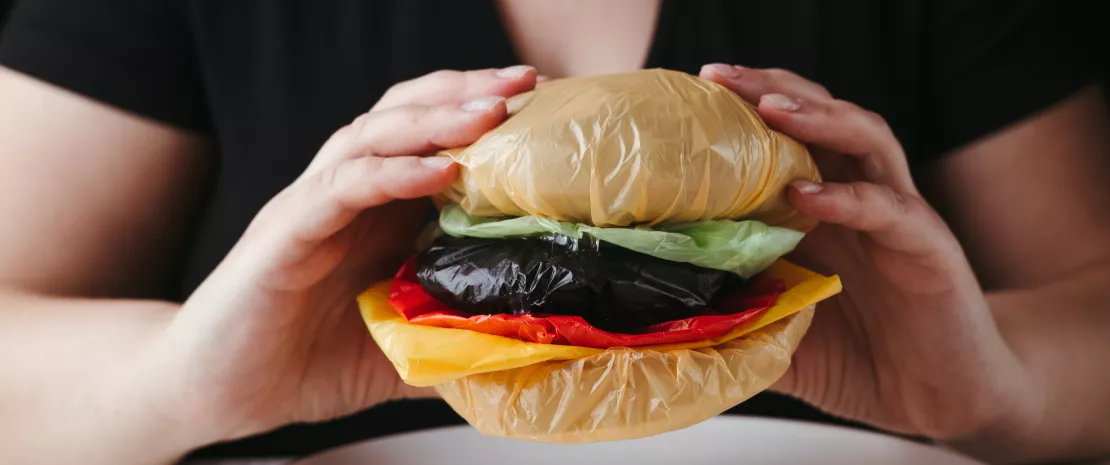Inflammatory Bowel Disease (IBD) and microplastics: an explosive cocktail?
Do you know what a plastic bottle, a fast food container and a polyamide sweater have in common? They are all thought to be sources of microplastics that end up in our intestines. With nevertheless differences depending on whether or not you suffer from Inflammatory Bowel Disease (IBD). Bon Appétit…
- Learn all about microbiota
- Microbiota and related conditions
- Act on your microbiota
- Publications
- About the Institute
Healthcare professionals section
Find here your dedicated section
Sources
This article is based on scientific information

About this article
Fish, coral reefs, shellfish and marine bacteria are not the only casualties of microplastics derived from the degradation of plastic bags. Microplastics are now everywhere: in the air we breathe, in the water we drink, and in the food we eat. No-one can escape them, as shown by a research team who found them in 100% of the stools of patients with IBD and also in those of healthy individuals.
5g plastic/week Humans are thought to ingest 5g of plastic each week, the equivalent of a credit card.
CIBD: stools full of microplastics
From homo erectus... to homo plasticus! Although we have all unwittingly become consumers of microplastics, it seems that we are not all in the same boat. So, depending on the health of our intestines, our stools do not contain the same number, size or type of plastic particles. This study showed that in people with Inflammatory Bowel Diseases (or IBD) such as Crohn's disease or ulcerative colitis, these microplastics were:
- more numerous (around 42 pieces/gram of dry fecal matter vs. 28 in healthy subjects),
- generally smaller (<50 μm),
- and of different origin, with PET (a plastic typically used in bottles of water), polyamide (derived particularly from synthetic textiles) or PVC (pipes, plastic flooring) being more abundant.
Crohn's disease
Crohn's disease is an Inflammatory Bowel Disease (IBD) whose cause is not yet known. This chronic inflammatory condition can affect every part of the digestive tract. It is characterized by damage to the intestinal wall, in which often deep lesions alternate with healthy areas. It progresses in flares interspersed with periods of remission. The intestinal microbiota seems to be implicated: a deterioration in the diversity and composition of the flora is observed in patients.
(sidenote: What is Crohn’s disease? Crohn’s & colitis foundation Torres J, Mehandru S, Colombel JF et al. Crohn’s disease. Lancet. 2017 Apr 29;389(10080):1741-1755. )
The team also noticed that the greater the quantities of microplastics present in the stools of IBD patients, the more severe was the disease. For all that, this does not necessarily mean that microplastics are responsible for IBD. Other explanations are possible. For example, the disease could cause greater retention of microplastics in the intestines, to such an extent that they are found in greater quantities in the stools. The researchers are still working to determine which is the consequence of the other, microplastics or IBD.
Ulcerative colitis
Ulcerative colitis is an Inflammatory Bowel Disease (IBD) characterized by ulceration of the surface of the mucous membrane of the colon. Its cause is not yet known. The gut microbiota is thought to be involved in the pathological process of the disease
(sidenote: Ulcerative colitis_Canadian Society of Intestinal Research Hu Y, Ye Z, Wu M, et al. The Communication Between Intestinal Microbiota and Ulcerative Colitis: An Exploration of Pathogenesis, Animal Models, and Potential Therapeutic Strategies. Front Med (Lausanne). 2021 Dec 13;8:766126. )
Our diet in the firing line
As for knowing where these tiny pieces of plastic come from, the team points to three sources:
- the consumption of bottled water, which goes hand in hand with a doubling of the quantity of plastic in the stools. This is not surprising, if you consider that bottled water contains 22 times more microplastics (especially PET) than tap water.
- the consumption of fast food, doubtless due to the plastic packaging;
- and exposure to dust, whether at work or elsewhere in life.
Another reason, if it was needed, to prefer home cooking and inert containers (glass jars): not only is it good for the planet, but good for our bodies too.












